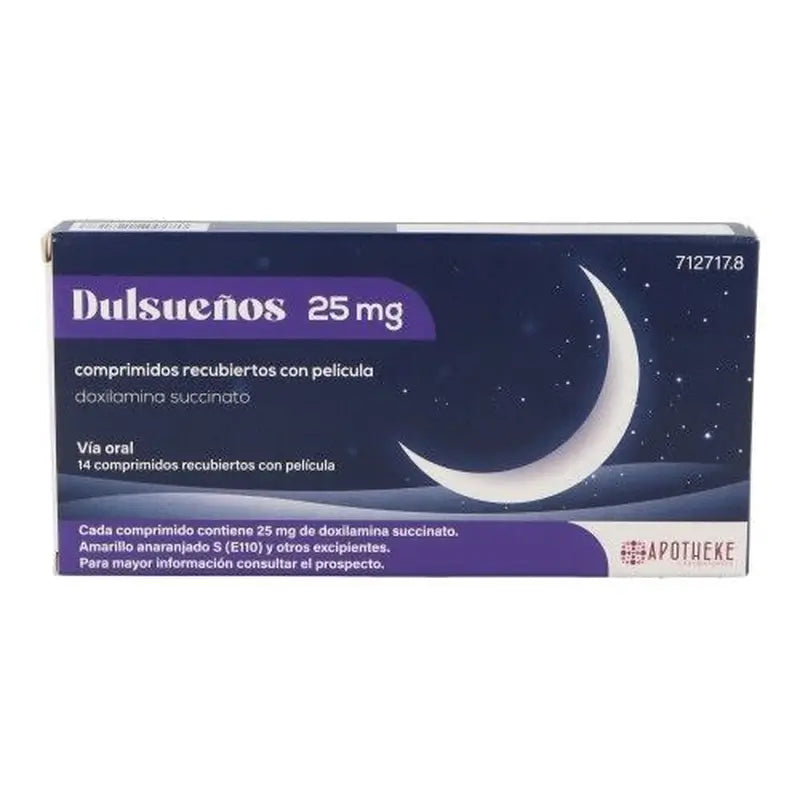It is a medicine whose active ingredient is doxylamine and belongs to the group of well-known antihistamines with sedative properties. It is therefore indicated for the treatment of occasional insomnia.
Contains 14 tablets.

It is a medicine whose active ingredient is doxylamine, which belongs to the group of well-known antihistamines with sedative properties. It is therefore indicated for the treatment of occasional insomnia.
It is indicated for adults over 18 years of age.
The recommended dose is 1 tablet (25 mg) a day.
If daytime drowsiness occurs, it is recommended to reduce the dose to 12.5 mg per day (other medicines are available with a lower dose), or to advance the dose to ensure that at least 8 hours elapse before waking time.
Do not take more than 1 tablet (25 mg) a day.
People over 65 years of age are more likely to suffer from other pathologies that may recommend a reduction of the dose. If undesirable side effects occur, it is recommended to reduce the dose to 12.5 mg per day.
If you are allergic to doxylamine or to any of the other ingredients of this medicinal product (listed in section 6).
If you are allergic to other antihistamines (anti-allergics).
If you are pregnant or breast-feeding.
Side effects of doxylamine are generally mild and transient, being more frequent in the first days of treatment.
Common side effects (may affect up to 1 in 10 people): drowsiness and effects such as dry mouth, constipation, blurred vision, urinary retention, increased bronchial secretion, vertigo, dizziness, headache, pain in the upper abdomen, fatigue, insomnia and nervousness.
Rare side effects (may affect up to 1 in 100 people): asthenia (tiredness), peripheral oedema (swelling of arms and legs), nausea, vomiting, diarrhoea, skin rash, tinnitus (noise in the ears), orthostatic hypotension (lowering of blood pressure due to a decrease in blood pressure), nausea and vomiting.(lowering of blood pressure due to changes in posture), diplopia (double vision), dyspepsia (upset stomach), feeling of relaxation, nightmares and dyspnoea (breathing difficulties).
Rare side effects (may affect up to 1 in 1,000 people): agitation (especially in children and the elderly), tremor, seizures or blood problems such as haemolytic anaemia, thrombocytopenia, leukopenia or agranulocytosis (decrease in certain blood cells).
Adverse effects of unknown frequency (cannot be estimated from the available data): general malaise.
Other adverse effects that have occurred with the use of antihistamines in general, but have not been observed with doxylamine, include the following: arrhythmia (altered heart rate), palpitations, duodenogastric reflux, abnormal liver function (cholestatic jaundice), cholestatic QT interval (QT interval of the heart), heart palpitations (heart palpitations).(a heart disturbance), decreased appetite, increased appetite, myalgia (muscle pain), abnormal co-ordination, extrapyramidal disorder (an abnormal heart rhythm), abnormal heart function (cholestatic jaundice), prolonged electrocardiogram QT interval (a heart disturbance).abnormal coordination, extrapyramidal disorder (movement disorders), paraesthesia (abnormal sensations), impairment of psychomotor activities (sense-movement coordination), depression, decreased secretion of bronchial tubes (bronchial secretion of the bronchi), decreased blood flow, decreased blood flow in the lungs, decreased blood flow to the lungs, decreased blood flow to the lungs, decreased blood flow to the lungs.(decreased bronchial secretion), alopecia (hair loss), allergic dermatitis, hyperhidrosis (excessive sweating), photosensitivity reaction or hypotension (low blood pressure).
The frequency and magnitude of adverse effects may be reduced by lowering the daily dose.
People over 65 years of age are at an increased risk of adverse reactions, as they may have other medical conditions or may be taking other medicines at the same time. They are also at increased risk of a fall.
Impaired liver and kidney function.
Epilepsy.
QT prolongation (a heart problem).
Low blood potassium levels or other electrolyte disturbances.
Heart disease and high blood pressure.
Asthma, chronic bronchitis (persistent inflammation of the bronchial tubes) and pulmonary emphysema (a disease that affects the lungs making it difficult to breathe).
Glaucoma (elevated eye pressure).
urinary retention
Prostatic hypertrophy (abnormal enlargement of the prostate).
peptic ulcer (erosion of the stomach wall or beginning of the intestine), pyloroduodenal obstruction (difficulty passing food from the stomach to the intestine) and bladder neck obstruction (urinary tract disease).
If you have been taking it for 7 days and the lack of sleep does not improve, it is advisable to consult your doctor to assess the situation.
The price of non-prescription medicines is established by law. However, at Farmaciasdirect you can buy Dulsueños 25 Mg, 14 coated tablets at a discount of up to 10%, which is the legal maximum allowed.
